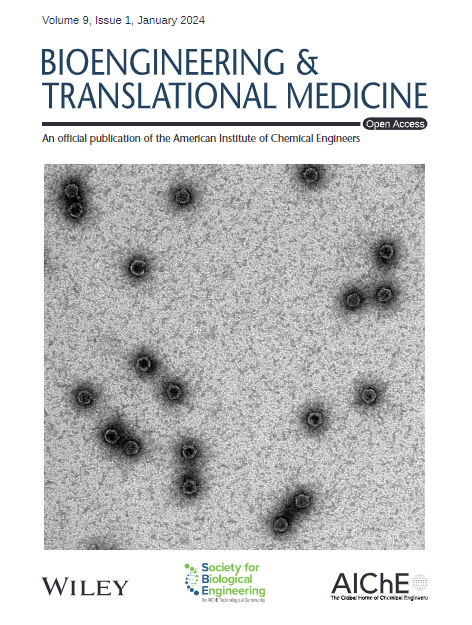高效降解支链氨基酸的活性生物治疗产品的设计和药效学研究
IF 5.7
2区 医学
Q1 ENGINEERING, BIOMEDICAL
引用次数: 0
摘要
支链氨基酸(BCAAs)的体内平衡在维持健康中起着至关重要的作用,而支链氨基酸的积累可导致多种疾病。因此,过量支链氨基酸的外源性降解或转化可能有助于缓解由支链氨基酸积累引起的疾病,如枫糖浆尿病。本研究利用合成生物学方法,通过将特定的代谢途径整合到大肠杆菌Nissle 1917 (ECN)中,成功地设计了两株高效分解BCAA的菌株——ECN - Deg和ECN - tra。ECN‐Deg集成了BCAA降解的代谢模块,而ECN‐Tra集成了BCAA转化的代谢模块。两种工程菌株在体外和体内均表现出高效的BCAA分解代谢。在高支链氨基酸小鼠模型中,ECN - Deg和ECN - Tra减轻了过量支链氨基酸引起的肝脏和回肠损伤,并降低了全身炎症水平。此外,ECN‐Deg和ECN‐Tra能够调节肠道微生物群,增加嗜muckermansia muciniphila和Mucispirillum schaedleri的丰富度,这与健康益处有关。此外,它们还减少了致病菌巴氏链球菌的丰富度。因此,本研究为开发益生菌治疗BCAAs代谢紊乱和BCAAs相关慢性疾病奠定了基础。本文章由计算机程序翻译,如有差异,请以英文原文为准。
Design and pharmacodynamic study of live biotherapeutic products with efficient degradation of branched‐chain amino acids
The homeostasis of branched‐chain amino acids (BCAAs) plays a crucial role in maintaining health, and the accumulation of BCAAs can lead to various diseases. Therefore, exogenous degradation or conversion of excessive BCAAs may help alleviate diseases caused by BCAA accumulation, such as maple syrup urine disease. This study utilized synthetic biology approaches to engineer two strains for efficient BCAA catabolism successfully—ECN‐Deg and ECN‐Tra—by integrating specific metabolic pathways into the chassis strain, Escherichia coli Nissle 1917 (ECN). ECN‐Deg integrates a metabolic module for BCAA degradation, while ECN‐Tra integrates a metabolic module for BCAA transformation. Both engineered strains demonstrate efficient BCAA catabolism in vitro and in vivo. In a high‐BCAA mouse model, ECN‐Deg and ECN‐Tra alleviated liver and ileal damage caused by excessive BCAAs and reduced systemic inflammation levels. Furthermore, ECN‐Deg and ECN‐Tra were able to modulate the gut microbiota, increasing the richness of Akkermansia muciniphila and Mucispirillum schaedleri , which are associated with health benefits. Additionally, they reduced the richness of the pathogenic bacterium Streptococcus pasteurianus . Thus, this study lays the foundation for the development of probiotics for the treatment of BCAAs metabolic disorders and BCAAs‐related chronic diseases.
求助全文
通过发布文献求助,成功后即可免费获取论文全文。
去求助
来源期刊

Bioengineering & Translational Medicine
Pharmacology, Toxicology and Pharmaceutics-Pharmaceutical Science
CiteScore
8.40
自引率
4.10%
发文量
150
审稿时长
12 weeks
期刊介绍:
Bioengineering & Translational Medicine, an official, peer-reviewed online open-access journal of the American Institute of Chemical Engineers (AIChE) and the Society for Biological Engineering (SBE), focuses on how chemical and biological engineering approaches drive innovative technologies and solutions that impact clinical practice and commercial healthcare products.
 求助内容:
求助内容: 应助结果提醒方式:
应助结果提醒方式:


